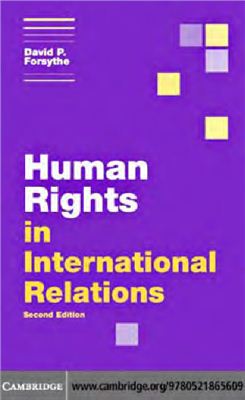Cambridge University Press, 2006. 285 p.
This new edition of David Forsythe’s successful textbook provides an authoritative overview of the place of human rights in inteational politics in an age of terrorism. The book focuses on four central themes: the resilience of human rights norms, the importance of soft law, the key role of non-govemental organizations, and the changing nature of state sovereignty. Human rights standards are examined according to global, regional, and national levels of analysis with a separate chapter dedicated to transnational corporations. This second edition has been updated to reflect recent events, notably the creation of the ICC and events in Iraq and Guantanamo Bay, and new sections have been added on subjects such as the correlation between world conditions and the
fate of universal human rights. Containing chapter-by-chapter guides to further reading and discussion questions, this book will be of interest to undergraduate and graduate students of human rights, and their teachers.
david p. forsythe is Charles J. Mach Distinguished Professor of Political Science at the University of Nebraska, Lincoln. He is the author of numerous Inteational Relations titles including The Humanitarians: The Inteational Committee of the Red Cross (2005) and Human Rights and
US Foreign Policy: Congress Reconsidered (1988) which won the Manning J. Dauer Prize.
The foundations
Introduction: human rights in inteational relations
Establishing human rights standards
Implementing human rights standards
Global application of human rights norms
Transitional justice: criminal courts and alteatives
Regional application of human rights norms
Human rights and foreign policy in comparative perspective
Non-govemental organizations and human rights
Transnational corporations and human rights
The politics of liberalism in a realist world
This new edition of David Forsythe’s successful textbook provides an authoritative overview of the place of human rights in inteational politics in an age of terrorism. The book focuses on four central themes: the resilience of human rights norms, the importance of soft law, the key role of non-govemental organizations, and the changing nature of state sovereignty. Human rights standards are examined according to global, regional, and national levels of analysis with a separate chapter dedicated to transnational corporations. This second edition has been updated to reflect recent events, notably the creation of the ICC and events in Iraq and Guantanamo Bay, and new sections have been added on subjects such as the correlation between world conditions and the
fate of universal human rights. Containing chapter-by-chapter guides to further reading and discussion questions, this book will be of interest to undergraduate and graduate students of human rights, and their teachers.
david p. forsythe is Charles J. Mach Distinguished Professor of Political Science at the University of Nebraska, Lincoln. He is the author of numerous Inteational Relations titles including The Humanitarians: The Inteational Committee of the Red Cross (2005) and Human Rights and
US Foreign Policy: Congress Reconsidered (1988) which won the Manning J. Dauer Prize.
The foundations
Introduction: human rights in inteational relations
Establishing human rights standards
Implementing human rights standards
Global application of human rights norms
Transitional justice: criminal courts and alteatives
Regional application of human rights norms
Human rights and foreign policy in comparative perspective
Non-govemental organizations and human rights
Transnational corporations and human rights
The politics of liberalism in a realist world

